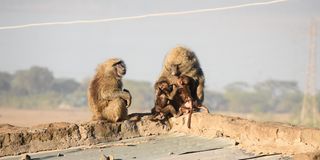Human-wildlife conflict worsens in Nakuru as dry season sets in

Baboons from Lake Nakuru National Park repeatedly invade homes near the park.
In the last two months, Nakuru has witnessed human-wildlife conflict in various parts of the county.
In a heroic act, Lilian Akinyi found herself on the receiving end of a baboon attack while rescuing a one-year-old child from a group of baboons, that had entered the house where she worked as a house help.
She suffered injuries to her left arm and was scheduled for surgery on September 26.
This incident occurred in Section 58, an area that has experienced similar occurrences.
On January 18, Bernard Ndung’u, another victim who had gone to visit his sister in the same area, suffered a similar fate when he was attacked by a baboon.
Last year, on October 31, Mtaa Wangu highlighted the plight of residents in Kaloleni C, Kivumbini Ward, who shared different accounts of how these primates have caused them to incur losses, from killing chickens to breaking the windscreens of their cars.
Despite these incidents being separate, many residents noted during interviews that the attacks typically occur from the final quarter of the year, to the beginning of the next.
On October 14, the residents of Mirugi Kariuki sought assistance from the Kenya Wildlife Service (KWS) in tracking down a predator that had killed their dogs and goats in the previous three weeks.
This concern arose after Njogu Ndagutha discovered three of his goats had been eaten by an unknown animal.
John Maina, the Nyumba Kumi Chairperson, reported that prior to the killing of Mr. Njogu’s goats, there had already been an incident involving a dog killed in a similar manner. This confirmed that a predator was indeed on the loose in their estate.
Last year, on October 25, Margaret Nyokabi, a resident of Kaloleni C, Kivumbini estate, found herself counting her losses after a hyena attacked her animals, killing sheep valued at Sh 30,000.
These incidents are no coincidence, as they tend to occur at the same time each year.
Currently, Nakuru is experiencing unusually high temperatures, which have become common as the year approaches its end. This rise in temperature could lead to more wild animals venturing into residential areas in search of food.
In Mtaa Wangu’s "Visirani vya Nyani" special report conducted earlier this year, many residents complained that these animals often come out in search of food, as some of the individuals who were attacked were openly carrying food items.
The issue of human-wildlife conflict remains a significant concern for many residents living near Lake Nakuru National Park.
With the hot weather persisting, the situation may worsen as more wild animals come out of the Park in search of food.

